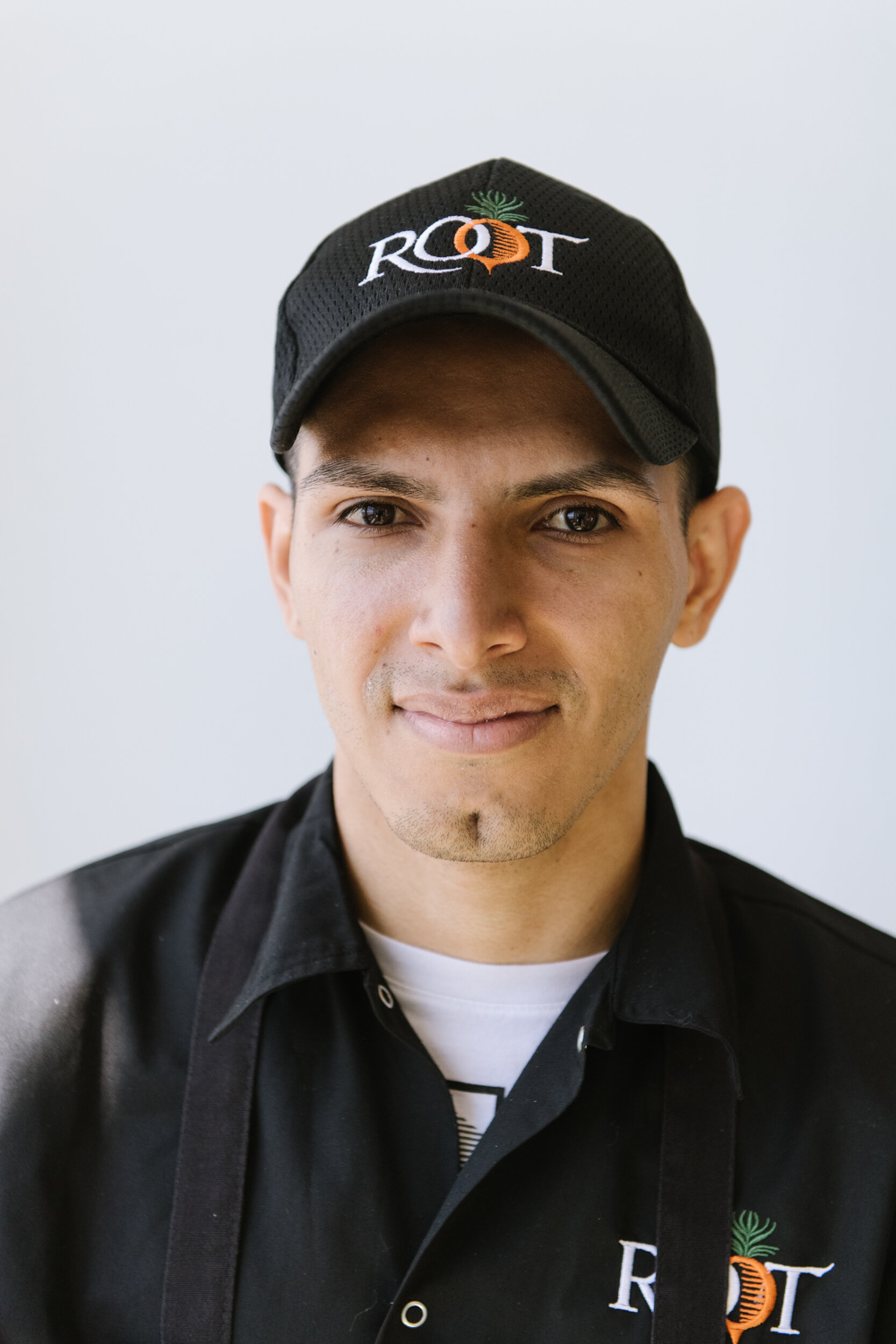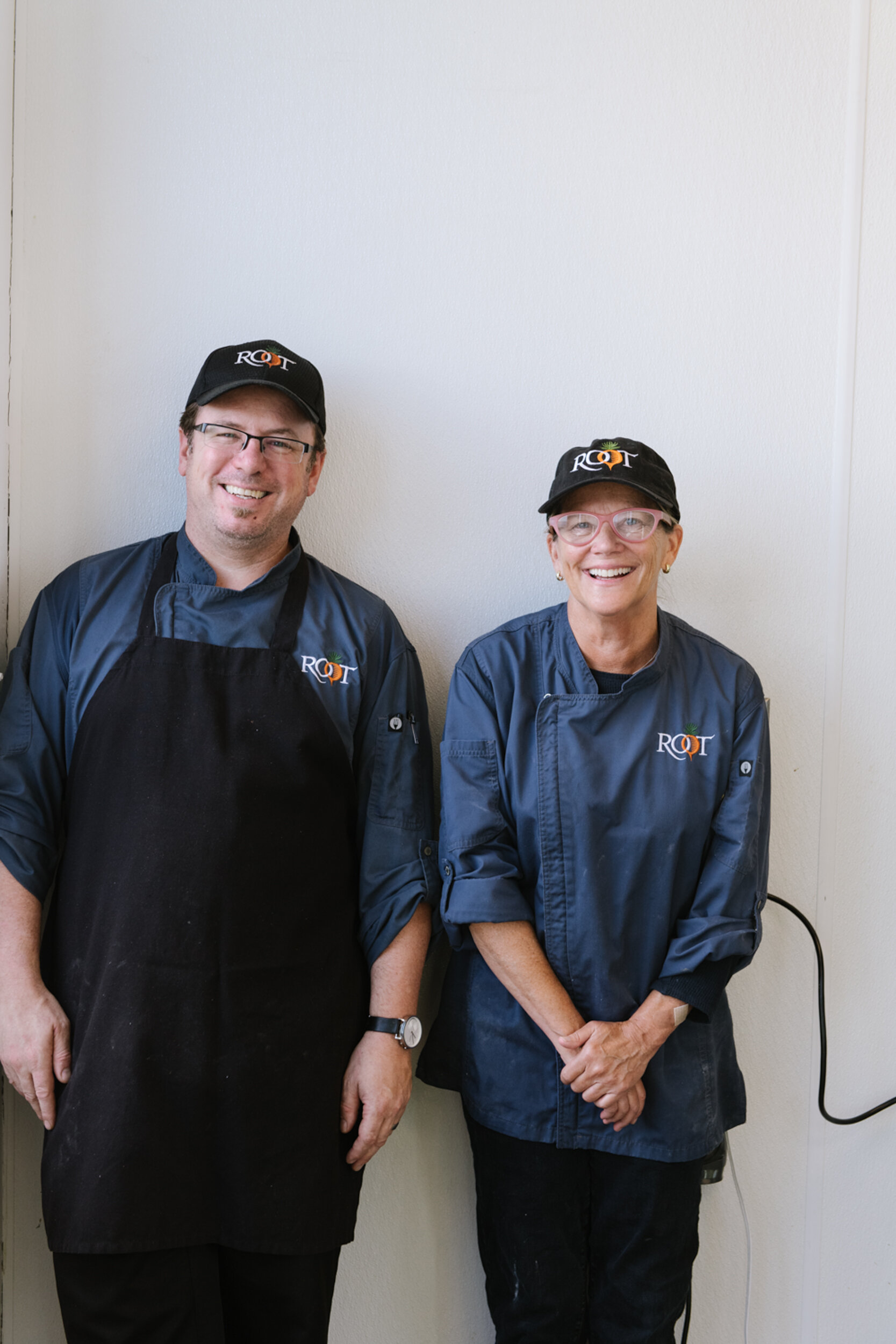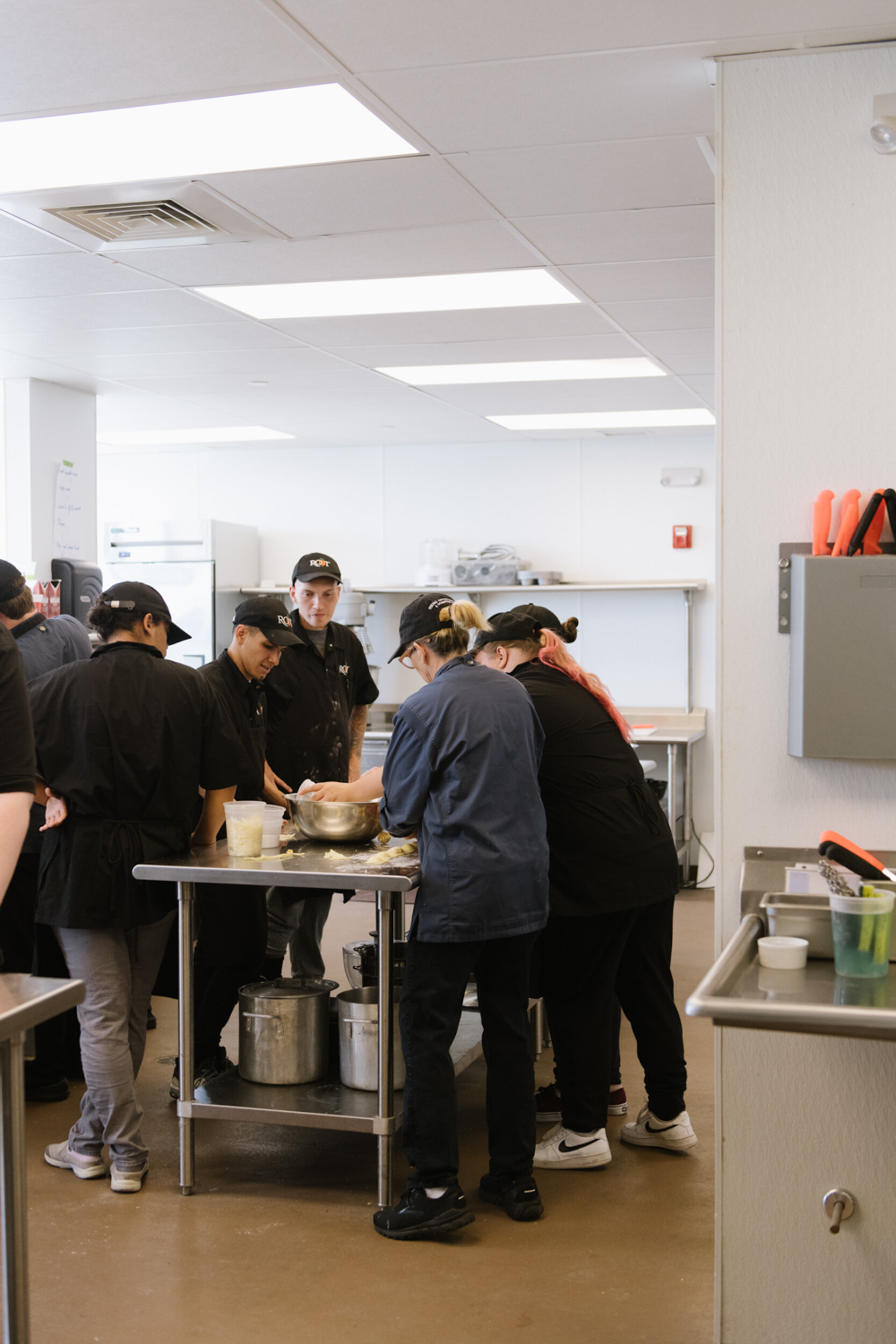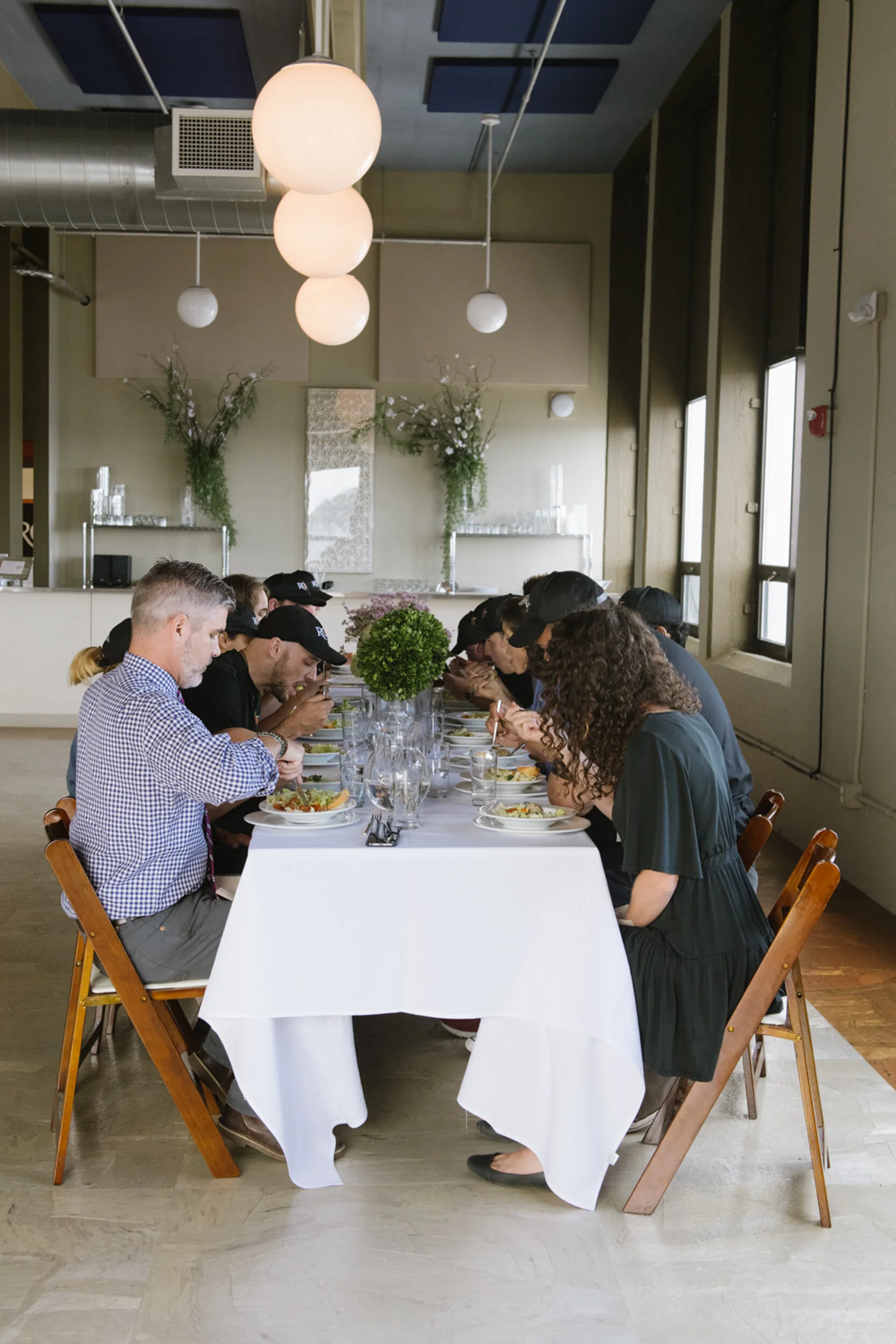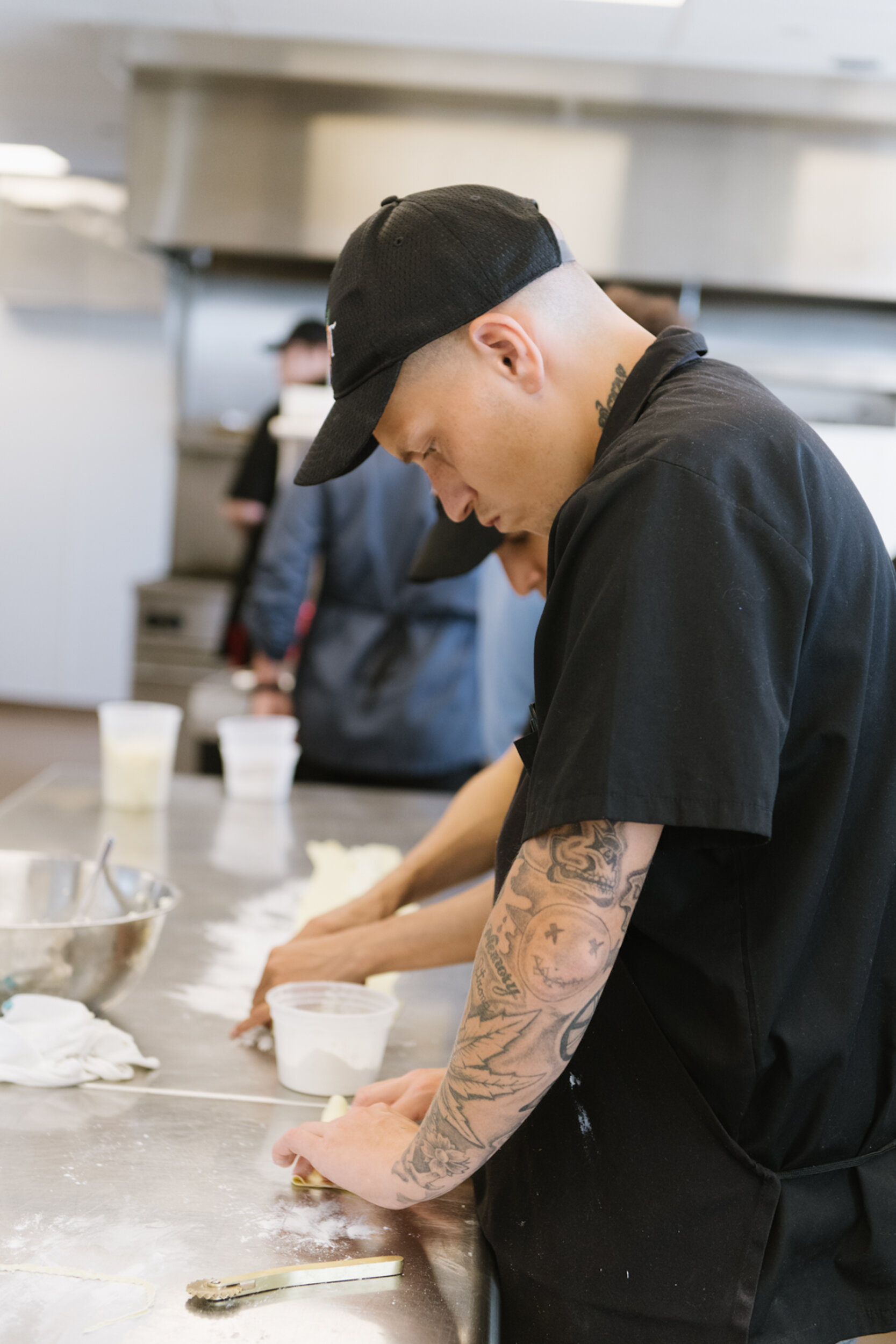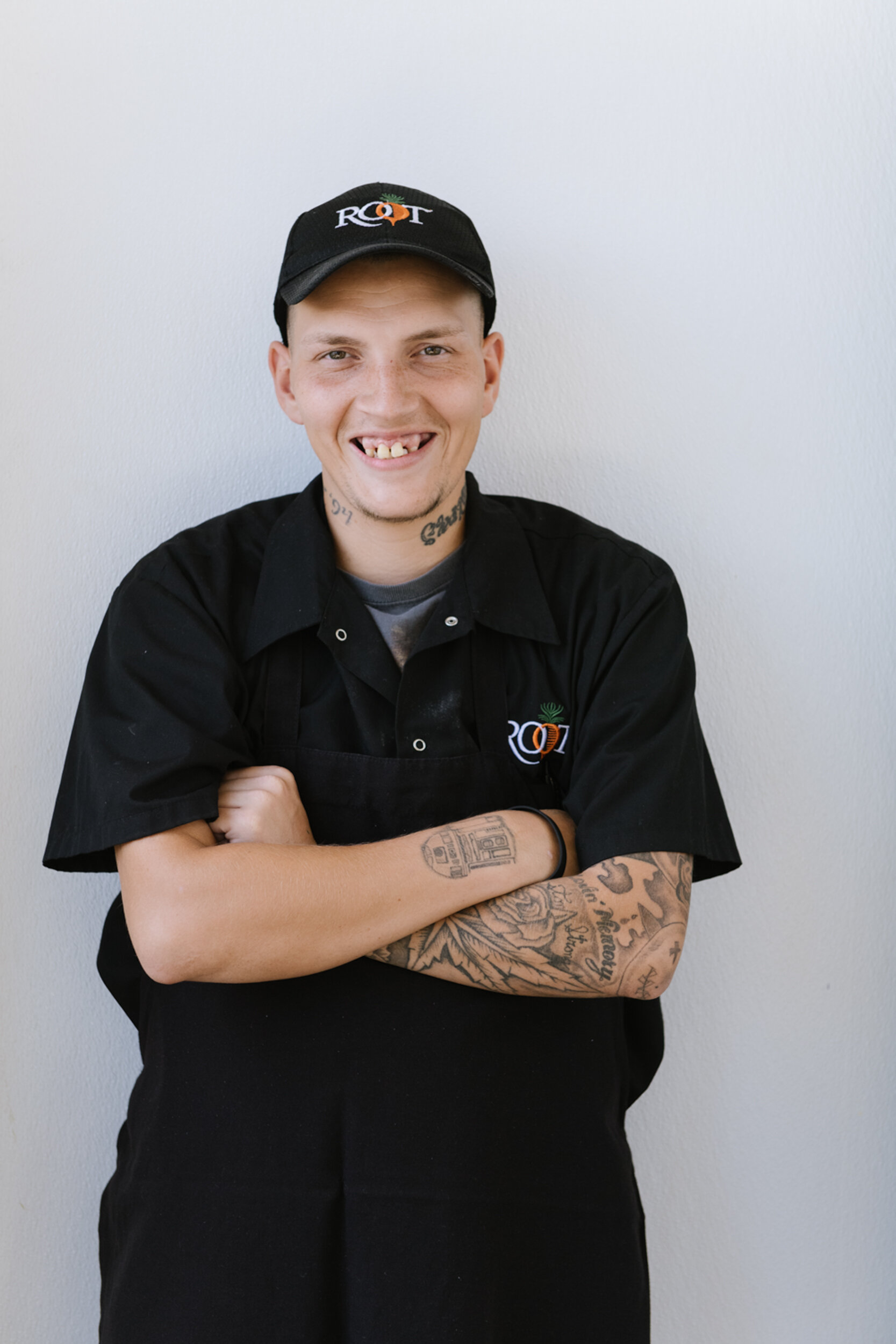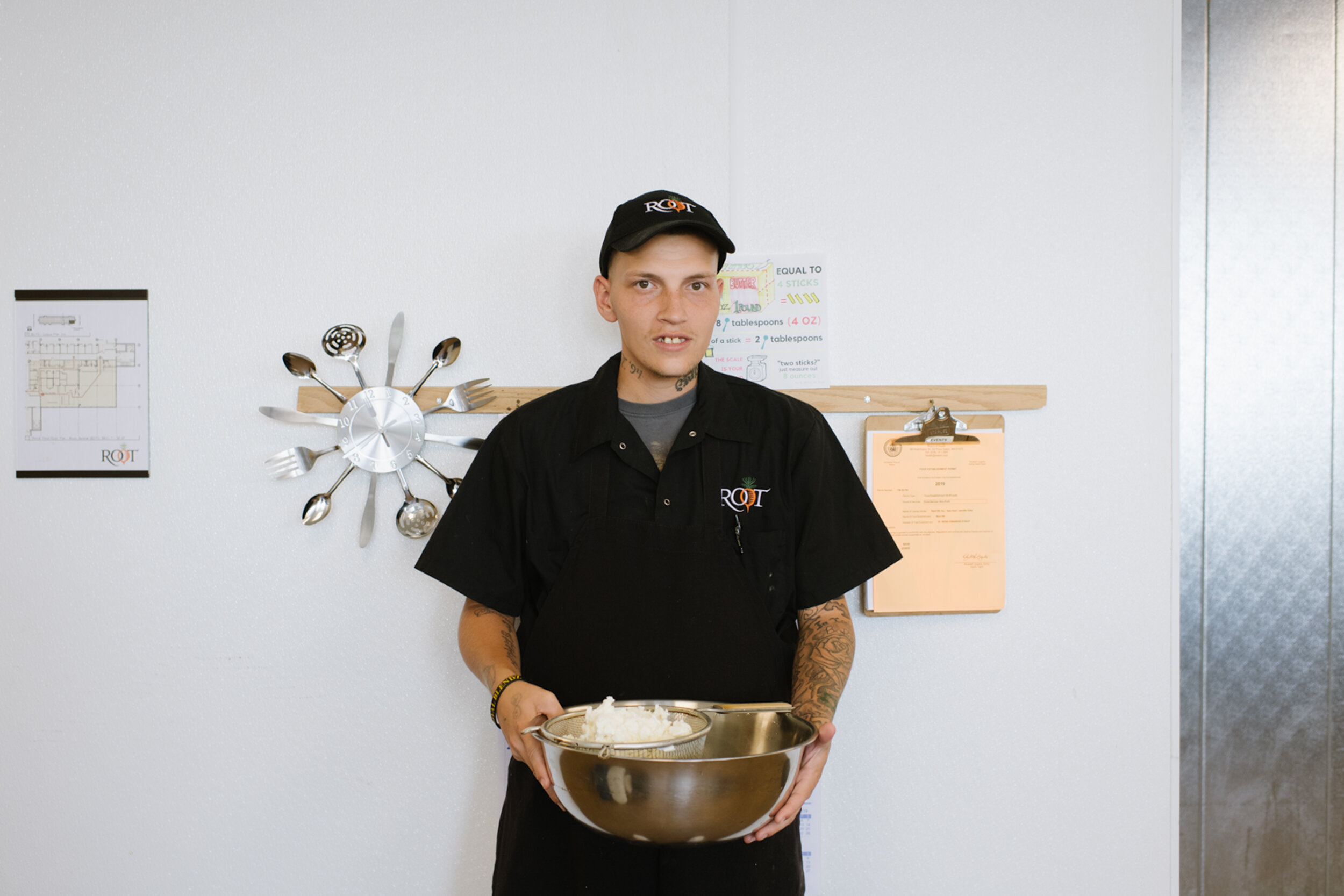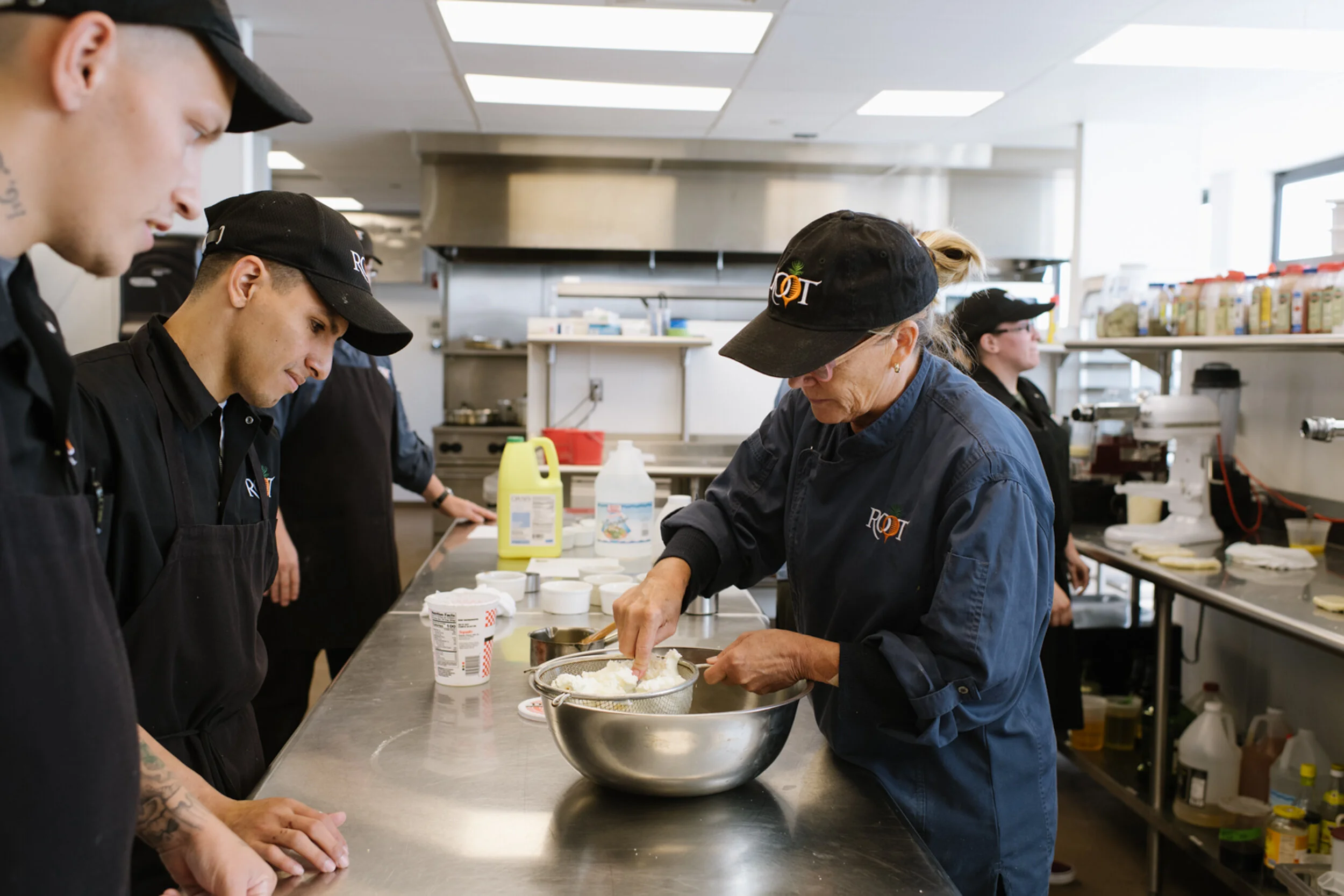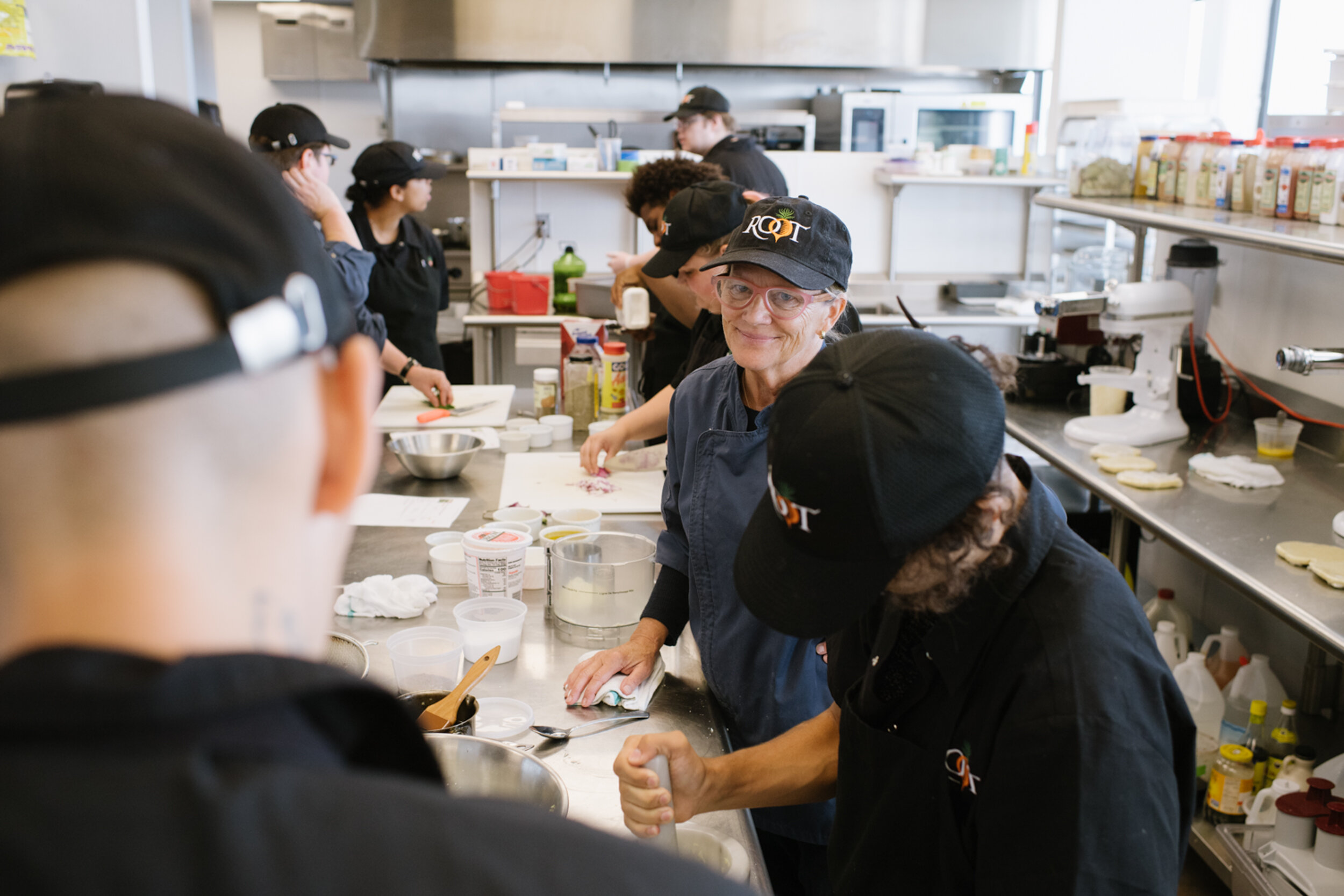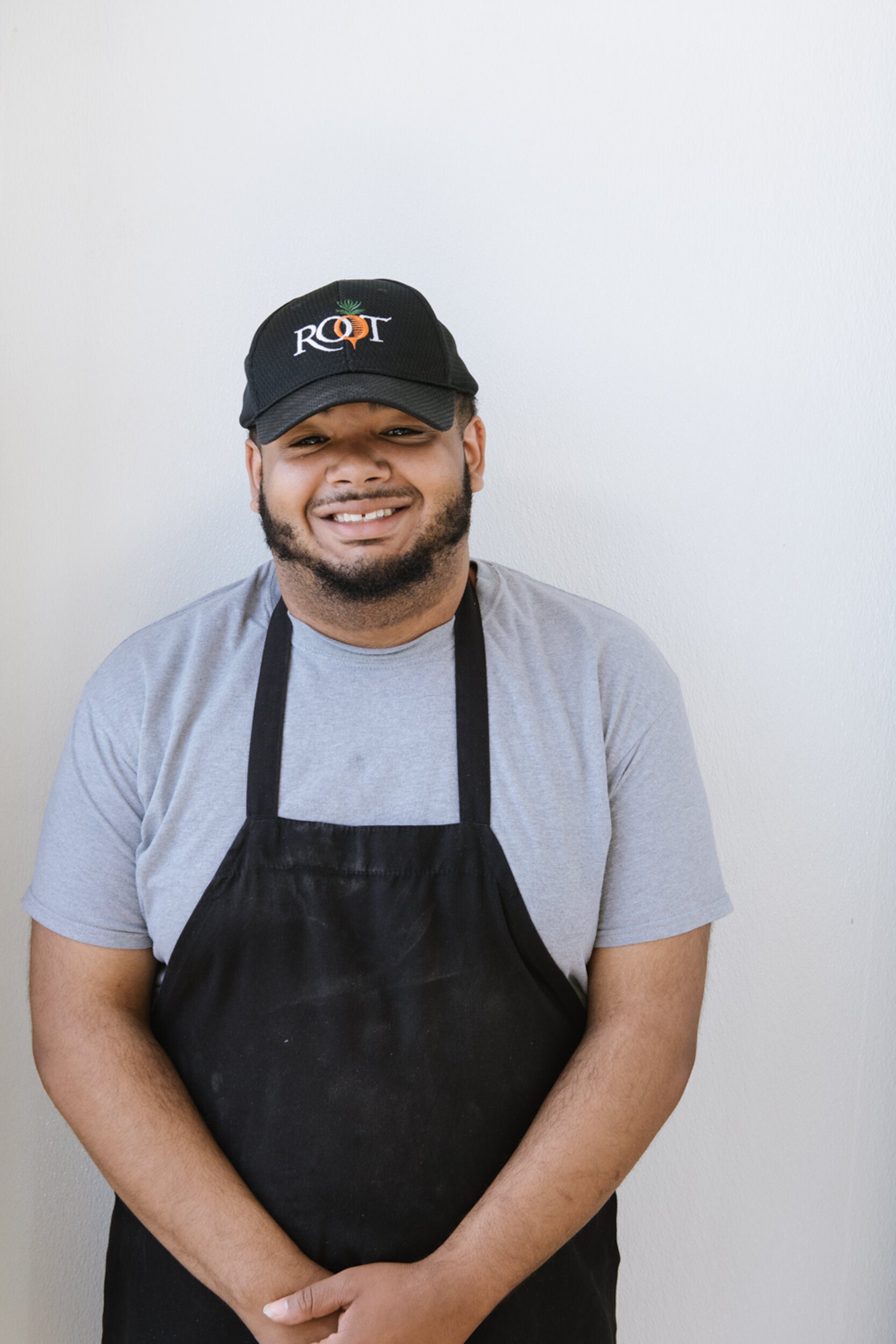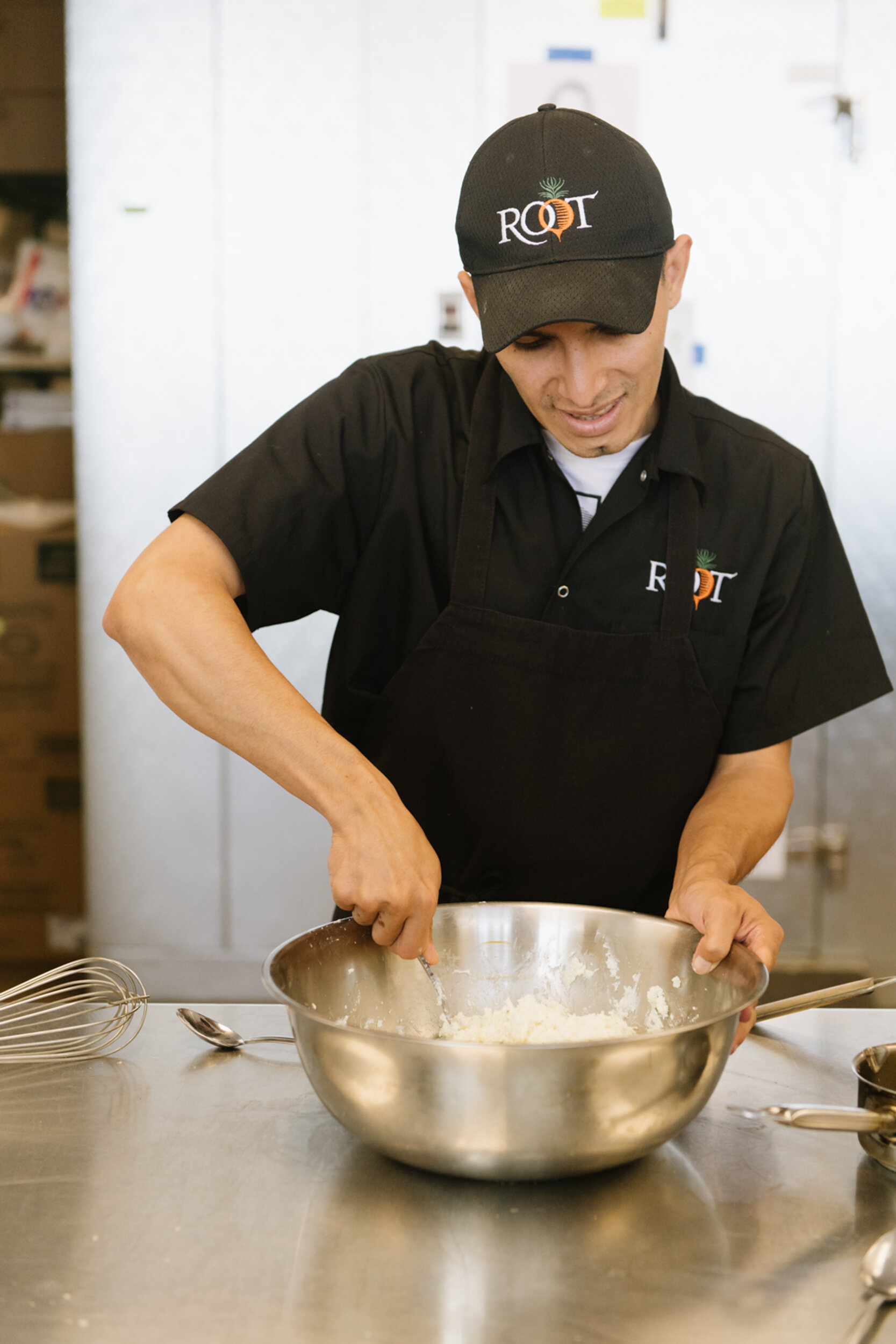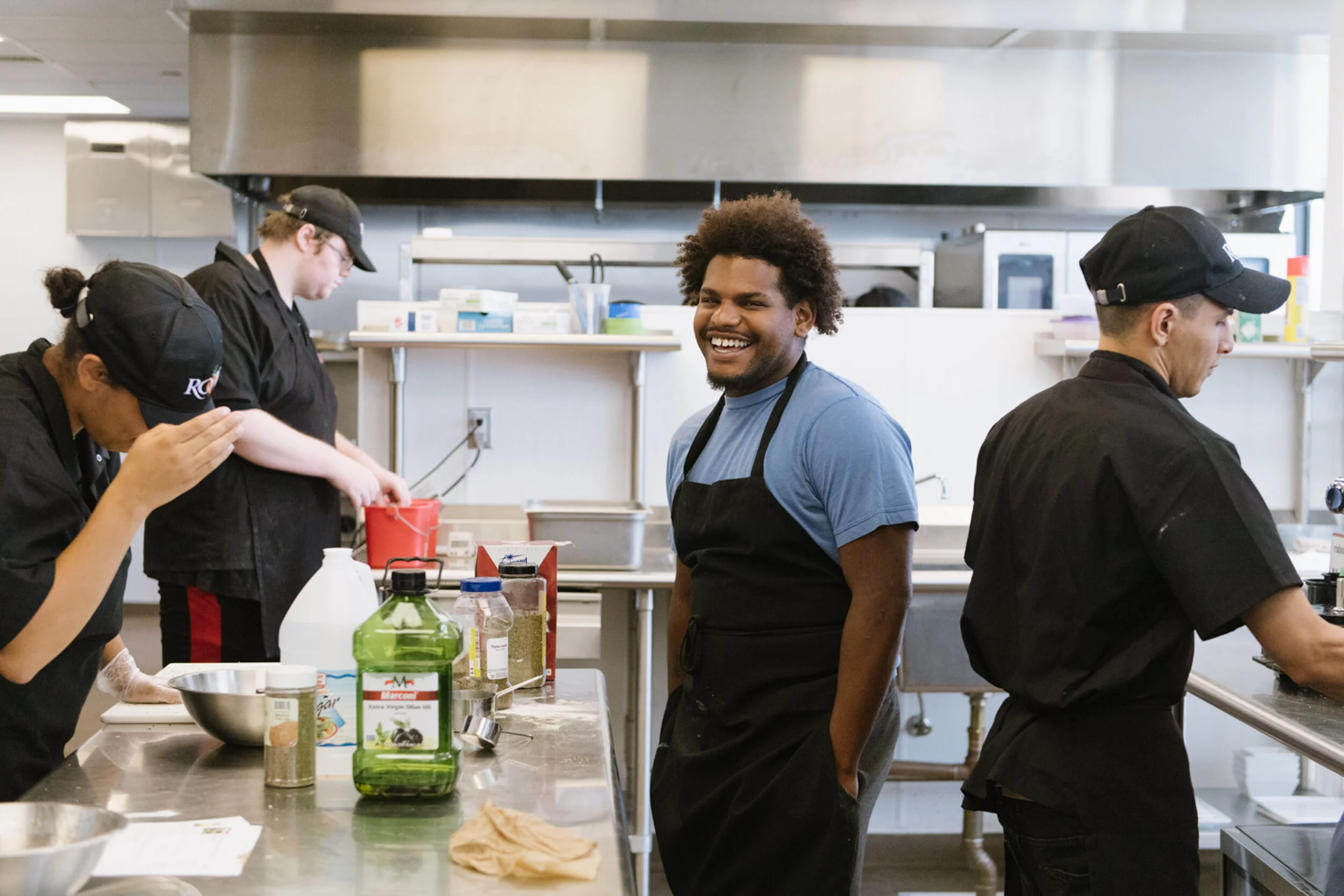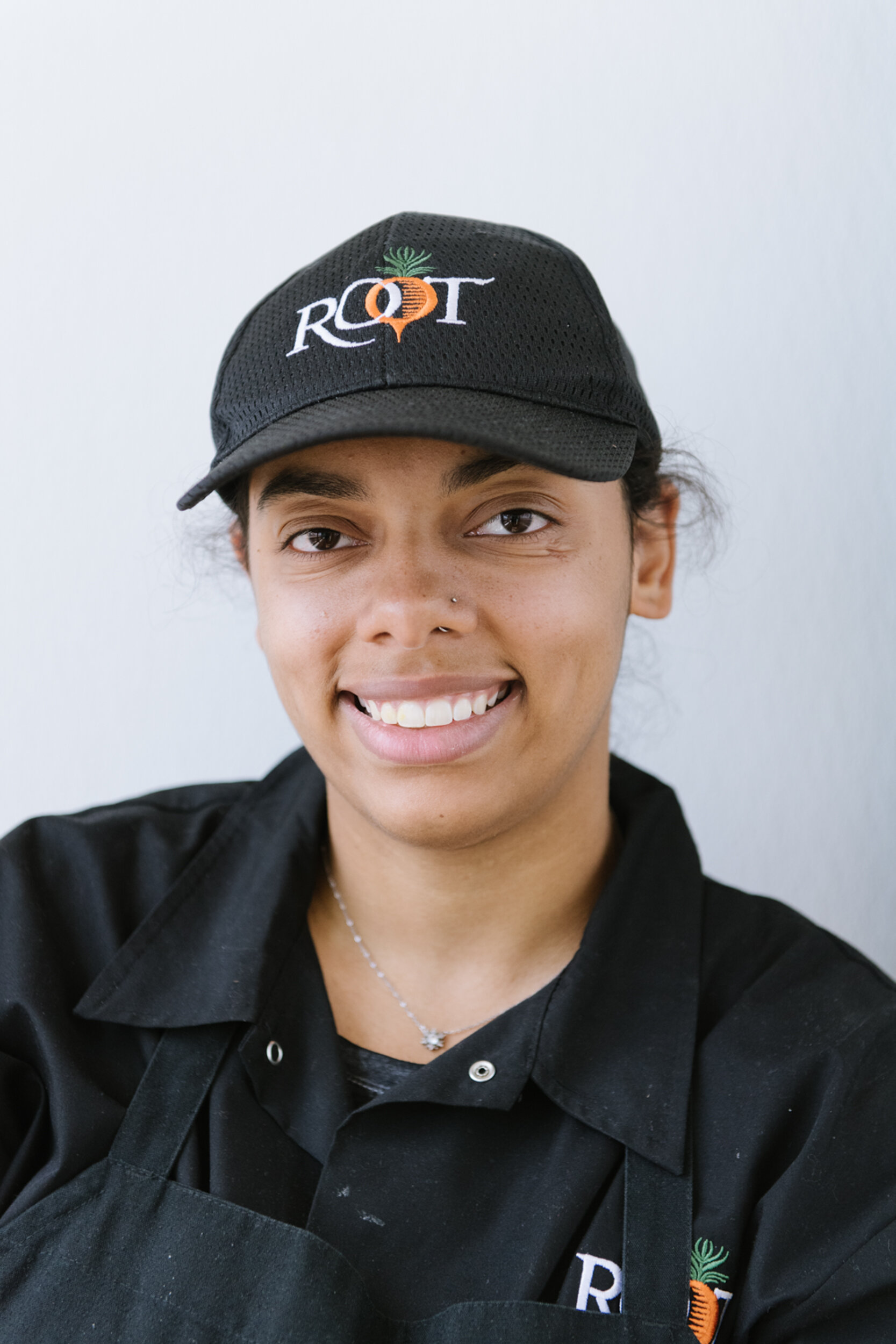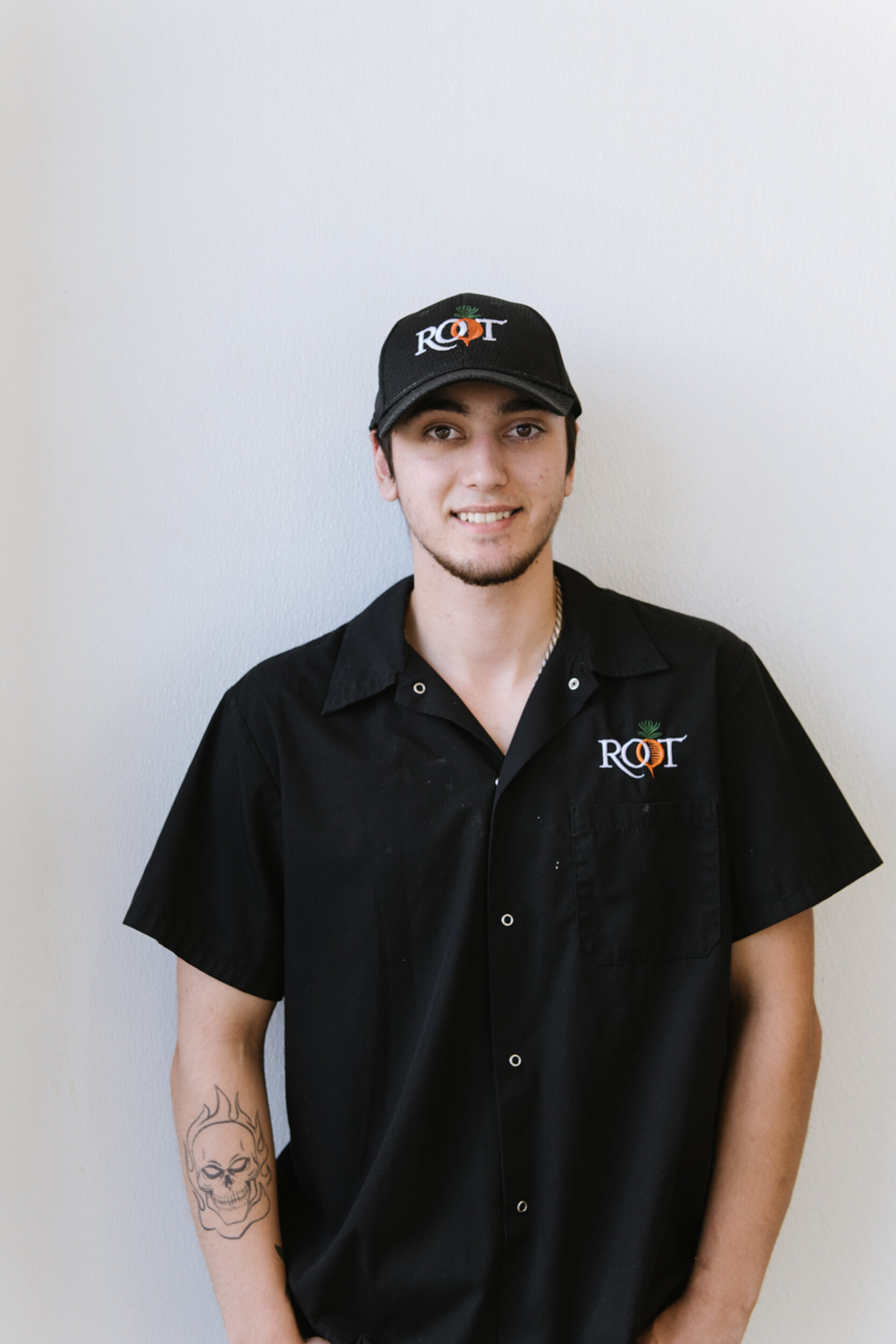Root North Shore: Cooking Their Way to Success
Photos by Katie Noble
The view out the windows is a stunning seascape of Salem harbor, but it’s mostly ignored as students in the professional kitchen of Root focus intently on today’s tasks: discerning taste and flavor. As the students at this innovative program to train young people in culinary skills sniff at powdered ginger and cinnamon and try to identify the aromas of parsley and other herbs, chef Sam Hunt and sous chef Robin Swayze each works with half the class of 16, divvying up responsibilities.
“Taste,” says Hunt, “is what you sense—sour, sweet, salt. Flavor is what you add.” One student says she loves the taste of celery; another is using a mortar and pestle to release the aroma of herbs.
“We’re going to be making a spice cake,” says Swayze, as she shows a young man how to peel and mince ginger root. Another student, dressed like the others in a black shirt with an orange Root logo, gets out a spice grinder to grind cloves, while yet another goes to find a liquid measuring cup for molasses. A student asks: “Is molasses good for the bones?” Chef Hunt laughs, saying that it is better than refined white sugar.
The students’ skills vary, one proficient at chopping, another rushing to gather ingredients and equipment, another quietly standing aside until Swayze persuades her to prepare the cake pan with butter and parchment paper. When Swayze suggests: “Let’s grab the food processor before they do,” students giggle as they run to get the machine.
The facts about Root—founded in 2016 by Jennifer Eddy, who left Wall Street to follow a culinary dream and then was inspired to train people between the ages of 16 to 24 in culinary skills—can be listed without getting to heart of this program.
“Root is in a lot of ways a disrupter,” says Executive Director M. Scott Knox, helping youths who are unsure, unmotivated, somehow stuck and disconnected, to find the next steps. Many Root students have dropped out of high school or have aged out of foster care at 18. Some have been referred by the courts, may have had addiction problems themselves or in their families, or are homeless. Many are just drifting, “having trouble getting out of bed,” Knox says.
For these students, the 12-week free program combines learning valuable culinary skills with daily sessions on “soft skills” that Root administrators believe are equally important. Interviewing skills and polishing a resume are covered. But there are others that might not seem obvious, such as “what does it mean when you sign” a document, and even “how to look someone in the eye and shake their hand.” As Beth Alaimo, program director who teaches these classes, says: “The biggest strides are in their growth, confidence and motivation.” Many of the youths come from Salem and Lynn as well as other North Shore towns and cities. One came every day from Brockton, the administrators say, marveling that he persisted even though it meant taking several trains, subways and walking to do so.
Just off the Root kitchen is a bright café, its cases filled with attractive packaged sandwiches and wraps, salads, pickled vegetables, juices, cookies and muffins. A smiling Root alumna welcomes customers, most of whom work in the sprawling complex that was once a textile mill and now houses businesses, social service agencies and a charter school. All the food is “whole-muscle cooking,” says Michael May, associate director of programming and culinary. Everything is made daily in the kitchen, and the café provides work experience for students and alumni as well as revenue.
“A lot of these kids have never had a job or been in a professional kitchen,” says May, who worked 15 years in restaurant management. The program accepts only 20 students a session. Learning how to use knives, how to properly wash hands and how to wash dishes are all part of the training, he says. “Half of cooking is cleaning,” he says, adding that washing dishes is part of learning the discipline and rigor needed in a job.
Accountability is crucial in the program; participants are allowed only five absences per session, and learn that calling in sick can put the entire team’s work at risk. There are always some who don’t last, but the retention rate is 65–75%, says Knox. One incentive is a $500 stipend that students work toward, with attendance, completing their resumes and passing ServSafe certifications, which all students take. Root helps the students find externships in restaurants, coffee shops and other food services or at Root catering events, and after graduation, helps them find jobs.
The current Root space, finished in October 2017, includes a large function room with wraparound windows over looking the harbor. Here Root caters events from small meetings to bar mitzvahs and other celebrations, many for area nonprofits. Offsite events include monthly Salem Community Meals, where students do both the cooking and serving.
Root does not operate in a vacuum, its founder Eddy points out, saying that the inspiration was a program for orphans in Cambodia. “Seeing this,” Eddy says, “combining giving back with food and youth” was a catalyst as were similar programs such as Liberty’s Kitchens in New Orleans and DC Central Kitchen. Eddy began working with mayors in Essex County, school principals and social service agencies such as Catholic Charities in 2016, and although need for such a program existed all over the North Shore, Salem “was the obvious answer” because of its location, transportation and support. The enthusiastic backing of Mayor Kim Driscoll and the Salem school system were key, as well as financial support from individual donors. When recently asked about Root, Mayor Driscoll quickly asserts it’s the city that benefits most from Root. The program provides both an avenue for young people of Salem and elsewhere and a trained work force.
“We have a robust food scene” in Salem, she says, and “there’s no end to the need for trained people” to work in hospitality. But moreover, Root is training young people who are “mature and career-ready.”
Angelo DeSimone, a Root graduate of early 2019, meets a visitor with a firm handshake and a smile, taking a few minutes away from his line cook duties. For DeSimone, who dropped out of high school and didn’t like the carpentry classes he was enrolled in, Root “gave me a job” and the communication skills to get ahead “even something like knowing how to look someone in the eye and properly shake their hands.” He’s 19 but feels, he says, like “I’m 20-something,” and has more of a purpose and direction. As a graduate of Root, he makes sandwiches and salads for the café and often works on weekends on catering events.
“I like the rhythm of the work,” DeSimone says, even the sometimes “annoying” necessity of staying sanitary. He might not stay forever in the Root kitchen, he says, but the responsibility and the resume help has given him “job readiness.” And he’ll work at Root “until Chef kicks me out,” he jokes.
Knox, Root’s executive director, lays out the program’s finances: a modest budget of $1.1 million in fiscal 2019 with 22% of it earned income from catering, rentals and the café. Institutional grants and private donations make up the bulk of the rest, with a smaller amount raised at an annual event. Beyond its professional staff, an active board and advisory council includes such culinary luminaries as chefs Frank McClelland and Gordon Hamersley and cookbook author Nina Simonds, some of whom also teach guest classes to the students.
So far, Root has 74 graduates, many working in Salem coffeehouses and restaurants and elsewhere on the North Shore. Not only does the Root staff help students with resumes and setting up interviews, but often drives them to interviews.
Chef Sam Hunt, formerly a Beverly restaurant owner, earned an industrial design degree at Syracuse University before becoming a chef. Lesson plans became “a design problem” to determine teaching concepts, timing and flow. Students trade off tasks, each getting turns as managers as well as dishwashers, working under Hunt, sous chef and instructor Swayze and program graduates who mentor student cooks. Some students have a hospitality background; others don’t plan a restaurant future. The skills taught beyond cooking such as ServSafe, front of the house service and management can translate to jobs as baristas, retailers or bartenders. But like others, Hunt emphasizes: “It’s not really about the hard skills. Food gets them here,” he says, but learning to show up on time, dressing properly, working as a team—those are what matter the most. He recalls one student who lost his mother and had housing issues, but nevertheless “turned out to be the leader of the kitchen. This was his safe place, and he helped the whole class to success.”
Root can “tilt the dial a little bit,” Hunt says, adding that that former student just landed a full-time job. To him, helping students to that kind of growth is “much more rewarding than executing a perfect [restaurant] Friday night.”
Back in the kitchen, the spice cakes are baking, and the students take a break, some of them assembling on the steps outside in the summer sunshine. “We nailed it,” one says, smiling. Another invites the visitor to stay to try the cake, a chorus of good-byes echoing across the parking lot.
Their friendliness demonstrates what founder Eddy had said: “It’s so gratifying going to graduation.” She recalled seeing new students on the first days “often disconnected kids, shy, disheveled” and graduates with more confidence and social skills. The “transformation,” she says, “is hard to believe.”
This story appeared in the Fall 2019 issue.

